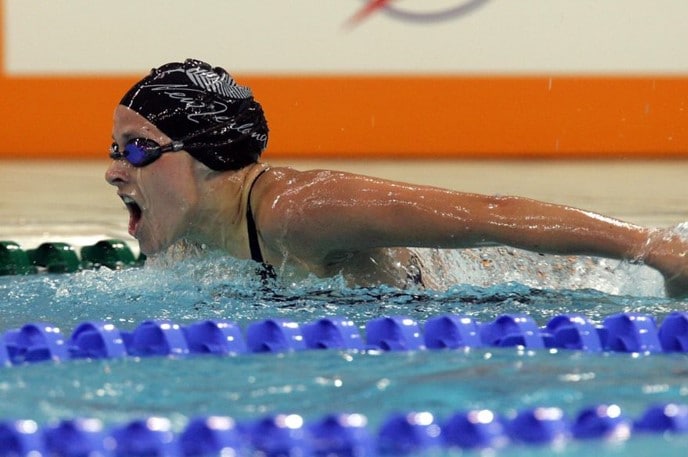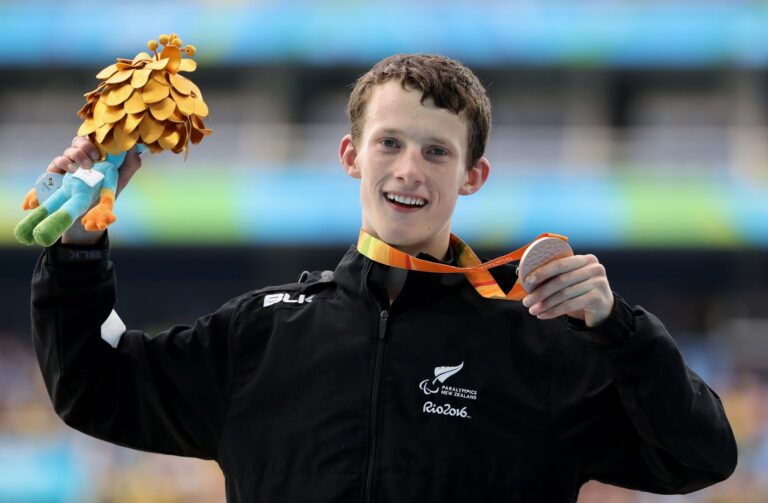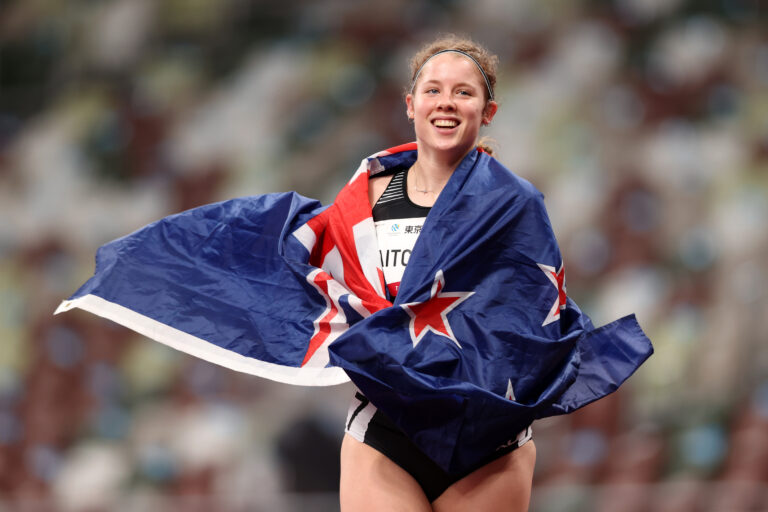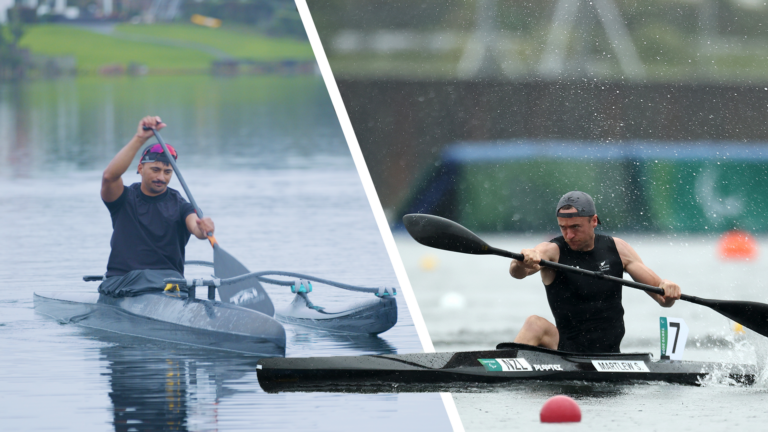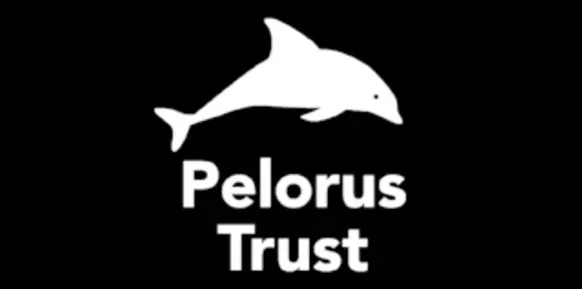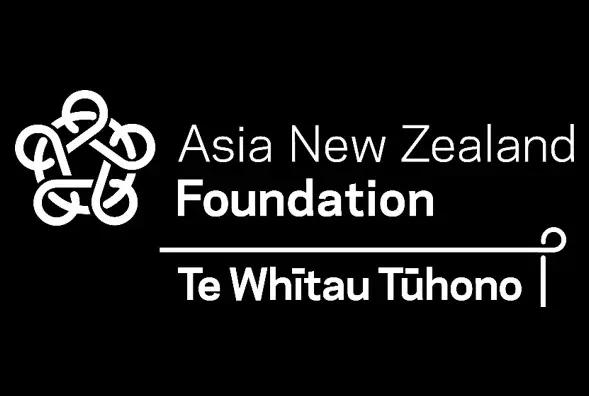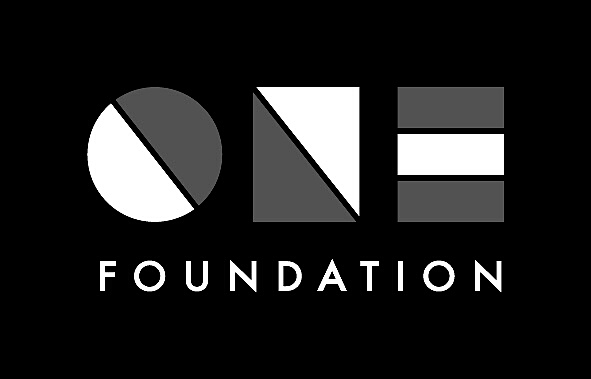Swimming served as therapeutic exercise and a fun pastime for a young Theresa Herd – until it blossomed into a pursuit taking her across the world, introducing her to lifetime friends and earning her a clutch of prized medals.
Pause at Hamilton’s Waterworld as the first waft of diluted chorine hits your nostrils and you’ll spot the collection of glass plaques honouring Waikato’s best swimmers. Theresa Griffin — Athens 2004 Paralympics. There she is. The girl who became an international Para swimmer almost by accident and won a bronze for New Zealand in the Women’s 100 metres Breaststroke SB9 at the 2002 World Championships in Argentina.
So much has changed for Theresa Herd, née Griffin, since her school days in Hamilton, back when she spent her early mornings and late afternoons counting laps, clocking her training times and then fruitlessly trying to wash that lingering trace of eau de chlorine out of her hair. She lives in New Plymouth these days, a chartered accountant, married, raising a wee baby son — and the hip replacement she managed to get in her early 20s has revolutionised her mobility to the point where she thinks it unlikely she would even have a classification if she went back to competitive Para swimming now.
The little high-performance club where Herd used to train, the Te Rapa Rovers, no longer exists, so it’s an especially nice touch to see her achievements commemorated at Waterworld. But how did it all start?
“We were just a typical Kiwi family that spent a lot of time around water at the bach, so our parents got us into learn-to-swim lessons as kids,“ says Herd. “Then when I was about 12, swimming turned out to be really good rehab therapy for my leg, and I just got more and more into it.“
Herd had been born with a misshapen pelvis and missing left hip socket. That meant a frame on her leg from the time she was about nine, to help the leg grow. “Consequently, I was missing a lot of muscle tone and flexibility. Swimming really helped with that — unlike running, it was something I could always do without it hurting me.“
It was serendipity that transformed this spot of therapy into a sports career which would take her from the UK to the USA, Argentina to Athens. At the pool where she was chalking up her laps Paralympian Sean Thretheway, who then became her first coach suggested she join his swim club — the aforementioned Te Rapa Rovers — and give competitive Para swimming a crack.
“I went from swimming twice a week to nine times a week and found out I was quite good! Jo Sullivan was my coach, she put in a lot of work with me at Rovers which I’ll never forget.“
Herd had enough use of her limbs to compete in small able-bodied club meets but was soon introduced to Parafed Waikato and Paralympics New Zealand and a whole new universe of support, tournaments and national training camps for developing Para swimmers emerged. “I started to meet other Para swimmers from across New Zealand, which was a very cool experience, especially as back in the early 2000s it wasn’t as big as it is now. There might have been just six of us at national camp.“
Para swimming meets provided a pathway to qualifying for international events and before she knew it, Herd had qualified to compete at the England nationals — a big open meet that attracts a lot of the top Para swimmers from all over Europe.
“I hadn’t even realised I was in line for a trip, so you can imagine I was stoked,“ says Herd, who was 14 at the time. “A team of six of us went over to England and then competed in America on the way back. It was my first competition against international Para swimmers, and where I got my international S10 competition classification confirmed (SB9 in breaststroke). I had six races in England and six in the USA, made almost all of the finals, got a couple of medals, and a world ranking! It was all very unexpected.“
She would quickly get used to it. Fired up with a new goal of representing New Zealand at the 2002 World Championships in Argentina’s Mar del Plata at the end of that year, it was: “train-train-train. Getting up in the dark in time to start my stretching at the pool by 5.30am, in the water by 6am for a 90- minute session, then off to school. Another two hours of training after school until 8.30pm. I always remember dinner would be in the microwave when I got home!
“I did a little bit of outdoor training for a while as well, and you’re sitting there at 5.30am and it’s cold and the fog is just starting to lift. Hard yakka! I got my license very quickly as my parents weren’t as excited about all the dawn starts.“
It was at those World Championships in Argentina that Herd won her first world championships medal for New Zealand: bronze in the 100 metres breaststroke. She had qualified for an impressive six finals across freestyle, backstroke, IM (individual medley), butterfly, and even the open water 5000 metres.
The 100m breaststroke — a fast lap up and down — was her favourite event, along with the 200 IM for its arduous racing. “Butterfly is so technical that most people have either got butterfly or they haven’t. With a strong backstroke as well, I was a bit unusual and quite suited to IM. I also liked the distance events, but the 400 IM and 800 freestyle weren’t Paralympic events at that time, so I was competing over 100 and 200 metres.“
Visiting South America as a 14-year-old was an unforgettable experience, not to mention the headiness of competing at her biggest international meet yet. Back in New Zealand the following year, a fired-up Herd won four gold medals at the 2003 World Wheelchair Games in Christchurch, setting national records in both the 200m IM and the 100m breaststroke — her personal horde a strong contribution to New Zealand’s 14 golds in total.
With the Athens 2004 Paralympics looming on the horizon, Herd was a near certainty for selection after qualifying with ‘A standard’ times in two events. “But when the phone rang, it was still that moment of shock — the ‘wow, this is actually happening, I’ve worked so hard for this for 15 months,’“ she says.
Miriam Jenkins, one of her Te Rapa Rovers training mates — who became like a second family — had also been selected. “It was so cool to have two of us from this tiny little club who had been training together for so long. We could keep training together and supporting each other at the Paralympics — quite a rarity at that level. I was also going to be the youngest in the New Zealand team, with Miriam, myself and Daniel Sharp all still at school.“
She fondly remembers being starstruck the day she headed to Karapiro to get her New Zealand uniform fitted at the Rowing NZ HQ. “Here were all these Olympic athletes doing the same thing — trying on their uniforms — that was when it really sunk in.“
Four intense weeks followed in Greece.
“I was a bit shaky on the blocks for my first few races — it was a full stadium, the biggest crowds I’d been in, and the way you enter into an arena like that is quite different from a casual little swim meet sitting on a bench and knowing half the people you’re racing against,“ remembers Herd. “In Athens, we were marshalled quite early and you’re sitting next to everyone you’re out to beat for what seems like forever. But once you’re in the water — you feel fine. Everything had led up to that moment, and my nerves got better as the meet went on.“
Herd made the 100m butterfly, breaststroke, backstroke and 200m IM finals, and was just one spot off qualifying for the 400m freestyle final to boot. A busy meet.
After Athens she continued to swim at university but had also grown and now needed surgery to insert pins to reduce pain and strengthen her left leg.
“Halfway through my first year doing my Bachelor of Commerce at uni I slipped over, cracked my hip and broke all those screws. I was on crutches for about nine months but ended up being able to get a hip replacement — when historically doctors had thought I was too young. It took about 10 months to recover. It was never a conscious decision to stop competitive Para swimming, but my life just headed in other directions after that.“
Herd still swims recreationally, in between balancing motherhood and working. She still can’t walk “massive distances“ without back pain, but she’s grateful to be able to walk without assistance. And hanging on her bookshelf is a world championship bronze medal that reminds her every day that anything is possible.
Story created by Storyation in partnership with Paralympics New Zealand.

